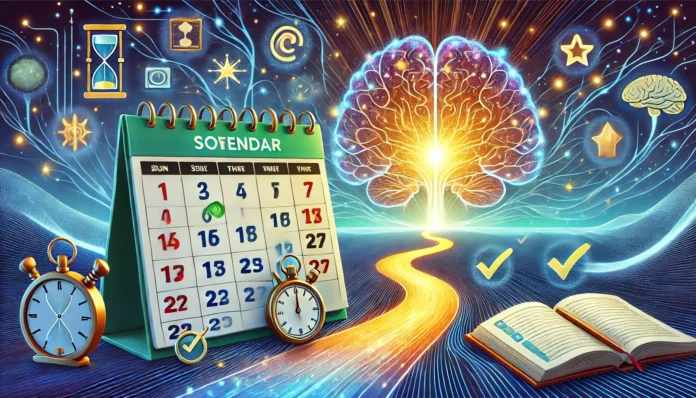How to Achieve Your Goals in 2025 with the Help of Neuropsychology
Another year, another fresh start. January always feels like a blank page, doesn’t it? We dream big, set ambitious goals, and feel a surge of motivation to become the best versions of ourselves for personal growth, career advancement, or healthier lifestyles. But let’s face it: how many times have we set similar goals only to see them postponed or abandoned? And by February, the gym memberships go unused, the planners gather dust, and our big dreams shrink into “maybe next Monday, or next month or next year.”
Why does this happen? Why do we postpone our plans despite our best intentions? From the standpoint of Neuropsychology what’s happening in your brain when you procrastinate—and, more importantly, how to outsmart it.
Why We Postpone Goals: A Brain’s-Eye View
- Your Brain Loves Comfort
The human brain is a brilliant but stubborn organ. As we learned from previous articles it’s wired for survival seeking comfort, not self-improvement avoiding discomfort. This means it craves comfort and familiarity, while goals often require effort, uncertainty, discipline, and change stepping out of our comfort zones, which triggers resistance. The amygdala, a part of the brain responsible for detecting threats, interprets change as a potential risk, making us hesitate or procrastinate.
When you decide to wake up at 6 AM to jog in the cold, your brain whispers, “Or… we could just stay in this warm bed.”
- The Dopamine Trap
Dopamine is the brain’s “motivation molecule,” motivation fuel, drives our desire to pursue rewards. It spikes when we anticipate rewards. When a goal feels distant, our brain produces less dopamine, reducing our motivation to act. This is why short-term distractions, which offer immediate dopamine boosts, often win over long-term objectives. Scrolling social media or binge-watching a series offers instant dopamine hits—far more tempting than, say, writing a business plan.
- Overwhelm Paralysis
Setting overly ambitious goals can overwhelm the prefrontal cortex, the brain’s decision-making center, responsible for planning and decision-making, might look at a goal like “run a marathon” and think, “Where do I even start?” When our brain perceives a task as too complex, it opts for easier, less demanding activities, leading to procrastination.
- Lack of Clear Neural Pathways
Every time you repeat a habit, it strengthens the neural pathways in your brain. Breaking old habits and forming new ones is like carving a new trail through dense forest—it’s hard work! Without persistence, your brain reverts to the well-worn paths it knows best. Achieving a goal requires forming new habits, which involve creating and strengthening neural pathways. If these pathways aren’t well-established, we revert to old patterns, delaying progress.
How to Finally Achieve Goals Properly In 2025: Neuropsychology-Backed Strategies
Here’s the good news: you can work with your brain, not against it. Knowing of the Neuropsychology can offer you fascinating insights to help you finally turn your dreams into action.
- Start with Micro-Habits/Shrink the Goal
Big goals are intimidating, but small steps feel doable. Break your goals into small, manageable steps. Want to exercise more? Start with five push-ups a day. Dream of writing a novel? Commit to one sentence. These micro-wins trigger dopamine release, which encourages and motivates you to keep going.
- Trick Your Brain with Visualization of your Success
Visualization activates the same neural networks as actually performing the task. Spend a few minutes each day imagining yourself achieving your goal, focusing on the emotions and sensations. Close your eyes and imagine yourself achieving your goal. Picture the sights, sounds, body and feelings. Visualization activates the same neural circuits as actually doing the task, convincing your brain it’s possible—and even enjoyable. This primes your brain to view the goal as attainable. You can always claim control over your mind, with these visualizations when your brain goes to “procrastination mode”
- Make Your Goals SMART
Vague goals like “I want to get fit” confuse your brain. Instead, make them SMART: Specific, Measurable, Achievable, Relevant, and Time-bound. For example, “I’ll jog for 20 minutes every Monday, Wednesday, and Friday at 7 AM” gives your brain a clear roadmap. This framework reduces cognitive load and makes the prefrontal cortex’s job easier.
- Use the Power of Deadlines and Accountability
Your brain loves urgency, so set deadlines. Commit to specific timelines. Deadlines activate the brain’s urgency mechanism, making us more likely to take action. Adding a social component, such as sharing your goal with friends, creates accountability and strengthens commitment. Accountability hacks your brain’s social wiring, making you more likely to follow through because you don’t want to let others down.
- Celebrate Every Win. Reward Progress, Not Perfection
Celebrate every step forward, each time you make progress, no matter how small. This reinforces the behavior by flooding your brain with dopamine. Each success triggers a dopamine release, reinforcing the behavior and motivating you to keep going. It’s like saying to your brain, “Good job, let’s do that again!”
- Optimize Your Brain with Neurofeedback
Neurofeedback is like a personal trainer to optimize your brain function. By improving focus, emotional regulation, stress management and resilience, neurofeedback helps you stay on track and handle setbacks more effectively. It’s a game-changer for anyone looking to unlock their full potential. By enhancing the brain’s ability to adapt and stay motivated, you’re more likely to follow through on your plans.
- Release your subconscious resistance with Regressive Therapy
You can release the need to procrastinate with this technique, as it guides you in a semi-conscious state to explore subconscious traumatic memories, often from early life or even pre-birth, to uncover deep-seated subconscious emotional patterns and imprints. Through techniques like guided visualization, regression therapy helps you revisit these memories safely, allowing you to release repressed emotions and gain valuable insights that break old, limiting patterns of procrastination.
Your Brain Is Not the Enemy
Here’s the thing: procrastination isn’t laziness or a personal failing—it’s a program in your brain of self preservation, your brain’s way of protecting you from perceived discomfort or failure. But with the understanding of how your brain works and the right strategies, you can rewire your brain to embrace growth, change, and success.
This year, let’s do things differently. Let’s outsmart our comfort-seeking brains, celebrate small wins, and build momentum toward our dreams. 2025 isn’t just another year—it’s your year to make it into your best year.
As we step into 2025, let’s commit to not just setting goals but achieving them. With the tools of neuropsychology which hack your subconscious mind and a little persistence, this could make it the year you unlock your full potential.So, what’s your first step?
Start living up to your potential in 2025. Reserve your consultation today and embrace a future free from procrastination. Online sessions are available on WhatsApp at 1(954)394-9196.




